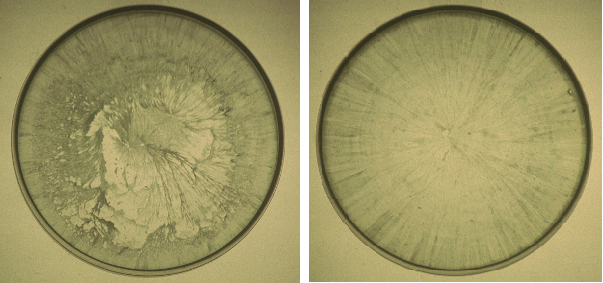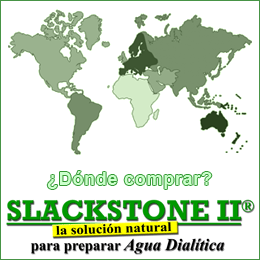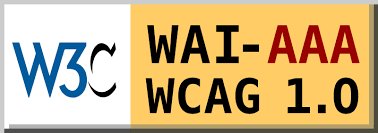Differentiated Technical Characteristics of Potable Water and Dialytic Water
1. Protocol
- Tap water (Paris) filtered at the tap through a Brita-type activated carbon filter: witness
- Tap water filtered with activated carbon and left in contact with a SLACKSTONE II® ampoule for 24 hours to prepare Dialytic Water.
2. Materials and methods
- A sensitive crystallization oven, personal model equipped with a regulator for temperature and another for hygrometry
- Two flat plates covered with a glass ring
- Two Petri dish lids
- Two Britta test tubes that allow the water to rest for 24 hours
- One ampoule of SLACKSTONE II®, Lot: S084, Expiration date: 11-2013, LAB YBORRA, S.L. Luís I, 70, 28031 MADRID, Spain
- 1 gr. of caseinate mixed with 500 ml of each water to make a sample (protein support): Na+ Caseinate, Armor Proteinas, lot C7576
- Copper chloride CUCl2 2(H2O) from the Ranchet laboratory, 96%: reference lot 01 313 250. Ranchet: 1 rue Jacquard ZI 69680 CHASSIEU. This copper chloride is prepared in soluble form and diluted to 10% to test the samples
- Glassware and pipettes necessary for preparations
- 2 ml of demineralized water
- 2 ml of aqueous sample to test (1 g of caseinate per 500 ml of filtered water)
- 2 ml of copper chloride
- Filtered Dialytic Water and filtered plain water on two flat plates with glass ring
- Filtered Dialytic Water and filtered plain water in two Petri dishes
- Temperature maintained for 12 hours at 28° C max.
- Hygrometry maintained for 12 hours at 62% max.
The experiment took place on 02/15/2009 at around 8 pm.
After a dozen hours, the crystallizations have been forming from a germinal center.
3. Results and Conclusion
|
Tap water (Paris) filtered at the tap through a Brita-type activated carbon filter: witness |
|
 |
Plain filtered water: small germinal center, dense and somewhat imprecise intermediate zone. With the Petri dish, the intermediate zone around the center even presents gaps, voids without glass. The texture is dense, rather weak, particularly around the center. The plates have numerous condensation spots, either around the center or on the periphery. The periphery is quite wide, which represents a general sign of less vitality. Condensation stains are generally signs of poor filtration, contamination, or saturation, indicating mediocre quality.
|
|
Tap water filtered with activated carbon and 24 hours in contact with SLACKSTONE II® ampoule |
|
 |
Filtered Dialytic Water: The germinal center is more open, the intermediate zone is more visible, and the texture is noticeably more substantial, developing richer secondary branches than with filtered water alone. The periphery is a little smaller. This sample has a crystallographic quality superior to that of filtered water alone, which could reveal a decontamination or purification of the water that would imply in this sense a better image of crystallization. |
Taking this test into account, we believe that the SLACKSTONE II® ampoule It is of real interest to purify water or give it a higher energetic or vibrational quality.
Author: Thierry FOLLIARD - Environmental Energy Engineer, Naturopath and Health expert.











